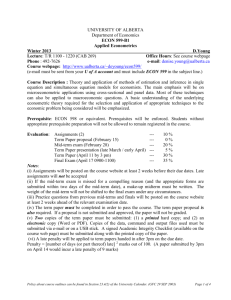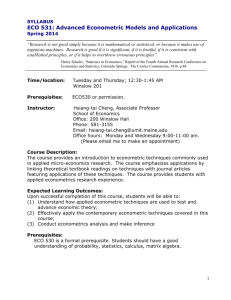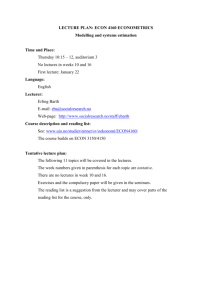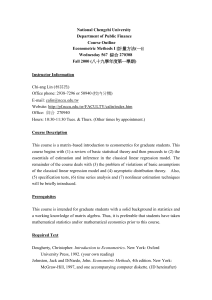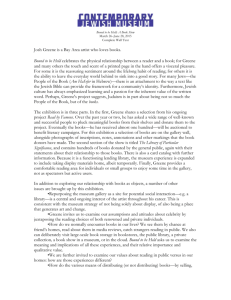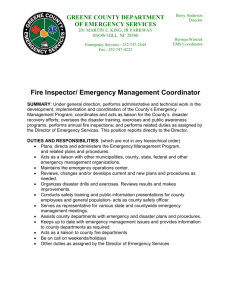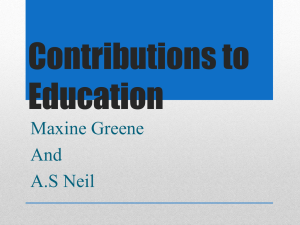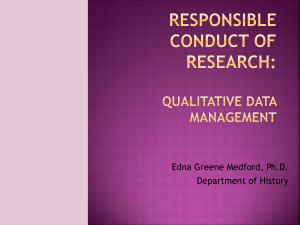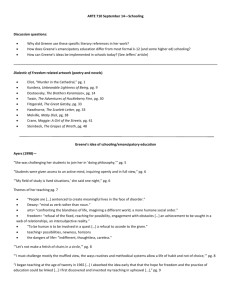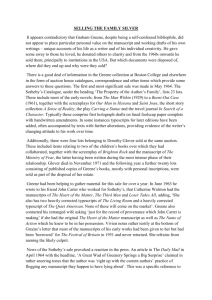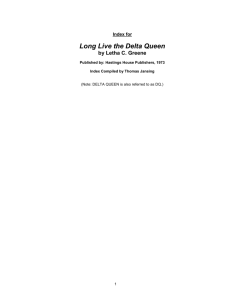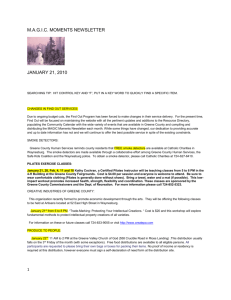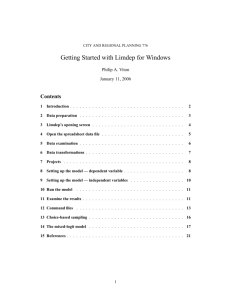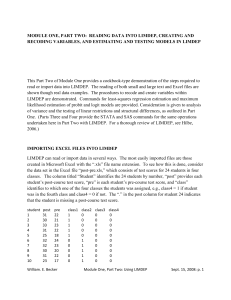UNIVERSITY OF ALBERTA
advertisement
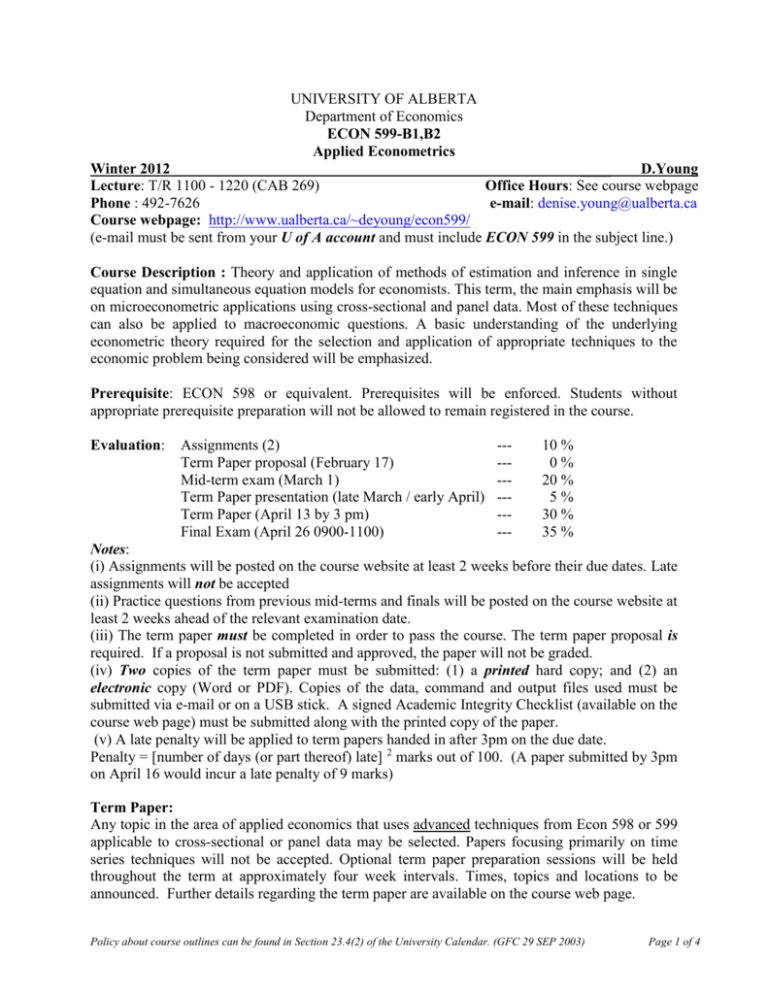
UNIVERSITY OF ALBERTA Department of Economics ECON 599-B1,B2 Applied Econometrics Winter 2012 ____ D.Young Lecture: T/R 1100 - 1220 (CAB 269) Office Hours: See course webpage Phone : 492-7626 e-mail: denise.young@ualberta.ca Course webpage: http://www.ualberta.ca/~deyoung/econ599/ (e-mail must be sent from your U of A account and must include ECON 599 in the subject line.) Course Description : Theory and application of methods of estimation and inference in single equation and simultaneous equation models for economists. This term, the main emphasis will be on microeconometric applications using cross-sectional and panel data. Most of these techniques can also be applied to macroeconomic questions. A basic understanding of the underlying econometric theory required for the selection and application of appropriate techniques to the economic problem being considered will be emphasized. Prerequisite: ECON 598 or equivalent. Prerequisites will be enforced. Students without appropriate prerequisite preparation will not be allowed to remain registered in the course. Evaluation: Assignments (2) Term Paper proposal (February 17) Mid-term exam (March 1) Term Paper presentation (late March / early April) Term Paper (April 13 by 3 pm) Final Exam (April 26 0900-1100) ------------- 10 % 0% 20 % 5% 30 % 35 % Notes: (i) Assignments will be posted on the course website at least 2 weeks before their due dates. Late assignments will not be accepted (ii) Practice questions from previous mid-terms and finals will be posted on the course website at least 2 weeks ahead of the relevant examination date. (iii) The term paper must be completed in order to pass the course. The term paper proposal is required. If a proposal is not submitted and approved, the paper will not be graded. (iv) Two copies of the term paper must be submitted: (1) a printed hard copy; and (2) an electronic copy (Word or PDF). Copies of the data, command and output files used must be submitted via e-mail or on a USB stick. A signed Academic Integrity Checklist (available on the course web page) must be submitted along with the printed copy of the paper. (v) A late penalty will be applied to term papers handed in after 3pm on the due date. Penalty = [number of days (or part thereof) late] 2 marks out of 100. (A paper submitted by 3pm on April 16 would incur a late penalty of 9 marks) Term Paper: Any topic in the area of applied economics that uses advanced techniques from Econ 598 or 599 applicable to cross-sectional or panel data may be selected. Papers focusing primarily on time series techniques will not be accepted. Optional term paper preparation sessions will be held throughout the term at approximately four week intervals. Times, topics and locations to be announced. Further details regarding the term paper are available on the course web page. Policy about course outlines can be found in Section 23.4(2) of the University Calendar. (GFC 29 SEP 2003) Page 1 of 4 Final Grade: Descriptor Excellent Good Satisfactory Failure Grading In Graduate Courses Letter Grade Point Value A+ 4.0 A 4.0 A3.7 B+ 3.3 B 3.0 B2.7 C+ 2.3 C 2.0 C1.7 D+ 1.3 D 1.0 F 0 Final course grades are determined according to the University calendar §23.4: Grades reflect judgments of student achievement made by instructors. These judgments are based on a combination of absolute achievement and relative performance in a class. Required Textbook Greene, W. (2010) Econometric Analysis, 7th ed, Prentice Hall. Recommended Text (available as an electronic text via U of A Library) Hall, A. (2005) Generalized Method of Moments, Oxford University Press. Reserve Room Materials (Rutherford Library): Kennedy, P. (2008) A Guide to Econometrics, 6th ed, MIT Press. Whistler, D. (2001) SHAZAM, econometrics software, version 9 : user's reference manual, Northwest Econometrics Software: Portions of the assignments will involve the use of Limdep, Shazam, Stata and TSP. For students registered in graduate programs in the Department of Economics, the software is available in the 9th floor lab and (for most packages) via the virtual computing lab. Limdep reference manuals are available (on reserve) at the Business library. TSP manuals are available online. Students enrolled in Economics graduate programs can also borrow Limdep, Shazam, Stata and TSP manuals from the General Office Policy about course outlines can be found in Section 23.4(2) of the University Calendar. (GFC 29 SEP 2003) Page 2 of 4 Course Topics: Topics may be covered in a different order than listed below, and some topics may be omitted. (1) Instrumental Variables and Generalized Method of Moments (GMM). Greene: 8, 13 Hall: 1-5 (2) Panel Data: Fixed and Random Effects; Dynamic Panels. Greene: 11, 13 (3) Non-linear Models and Flexible Functional Forms. Greene: 7, 10 (also see GMM references) (4) Stochastic Frontier Models Greene: 12, 14, 19 (5) Discrete Choice and Count Data Greene: 17, 18 (6) Survival / Duration Data Greene: 19 (7) Censored Regression (Tobit) Models Greene: 19 (8) Sample Selection Problems (Heckman and ML approaches). Greene: 19 (9) The Bayesian Approach to Econometrics* Greene: 16 (10) Other topics. If there is a specific (non-time series) topic that is not covered under one of the general areas listed above and that you would like to have covered in class, please let me know. Additional Resources for various topics may be posted from time to time on the course web page. * Note that this topic, if covered at all, will be covered towards the end of the course. Also, the software used in the course is not generally amenable to Bayesian estimation, so it is not advisable to select a Bayesian approach for your term paper. Policy about course outlines can be found in Section 23.4(2) of the University Calendar. (GFC 29 SEP 2003) Page 3 of 4 The University of Alberta is committed to the highest standards of academic integrity and honesty. Students are expected to be familiar with these standards regarding academic honesty and to uphold the policies of the University in this respect. Students are particularly urged to familiarize themselves with the provisions of the Code of Student Behaviour (online at www.ualberta.ca/secretariat/appeals.htm) and avoid any behaviour which could potentially result in suspicions of cheating, plagiarism, misrepresentation of facts and/or participation in an offence. Academic dishonesty is a serious offence and can result in suspension or expulsion from the University.” (GFC 29 SEP 2003) Infractions of the Code of Student Behaviour will be reported to the appropriate Faculty office. Audio or video recording of lectures, labs, seminars or any other teaching environment by students is allowed only with the prior written consent of the instructor or as part of an approved accommodation plan. Recorded material is to be used solely for personal study, and is not to be used or distributed for any other purpose without prior consent from the instructor. Excerpts from the Code of Student Behaviour: 30.3.2 Inappropriate Academic Behaviour 30.3.2(1) Plagiarism No Student shall submit the words, ideas, images or data of another person as the Student’s own in any academic writing, essay, thesis, project, assignment, presentation or poster in a course or program of study. 30.3.2(2) Cheating 30.3.2(2) a No Student shall in the course of an examination or other similar activity, obtain or attempt to obtain information from another Student or other unauthorized source, give or attempt to give information to another Student, or use, attempt to use or possess for the purposes of use any unauthorized material. 30.3.2(2) b No Student shall represent or attempt to represent him or herself as another or have or attempt to have himself or herself represented by another in the taking of an examination, preparation of a paper or other similar activity. See also misrepresentation in 30.3.6 (4). 30.3.2(2) c No Student shall represent another’s substantial editorial or compositional assistance on an assignment as the Student’s own work. 30.3.2(2) d No Student shall submit in any course or program of study, without the written approval of the course Instructor, all or a substantial portion of any academic writing, essay, thesis, research report, project, assignment, presentation or poster for which credit has previously been obtained by the Student or which has been or is being submitted by the Student in another course or program of study in the University or elsewhere. 30.3.2(2) e No Student shall submit in any course or program of study any academic writing, essay, thesis, report, project, assignment, presentation or poster containing a statement of fact known by the Student to be false or a reference to a source the Student knows to contain fabricated claims (unless acknowledged by the Student), or a fabricated reference to a source. ---------------------------------------------------------------------------------------------------For further information regarding plagiarism and cheating please refer to: http://www.uofaweb.ualberta.ca/TIE//pdfs/Plagiarismhandout.pdf http://www.uofaweb.ualberta.ca/TIE//pdfs/Cheatinghandout05.pdf Policy about course outlines can be found in Section 23.4(2) of the University Calendar. (GFC 29 SEP 2003) Page 4 of 4
